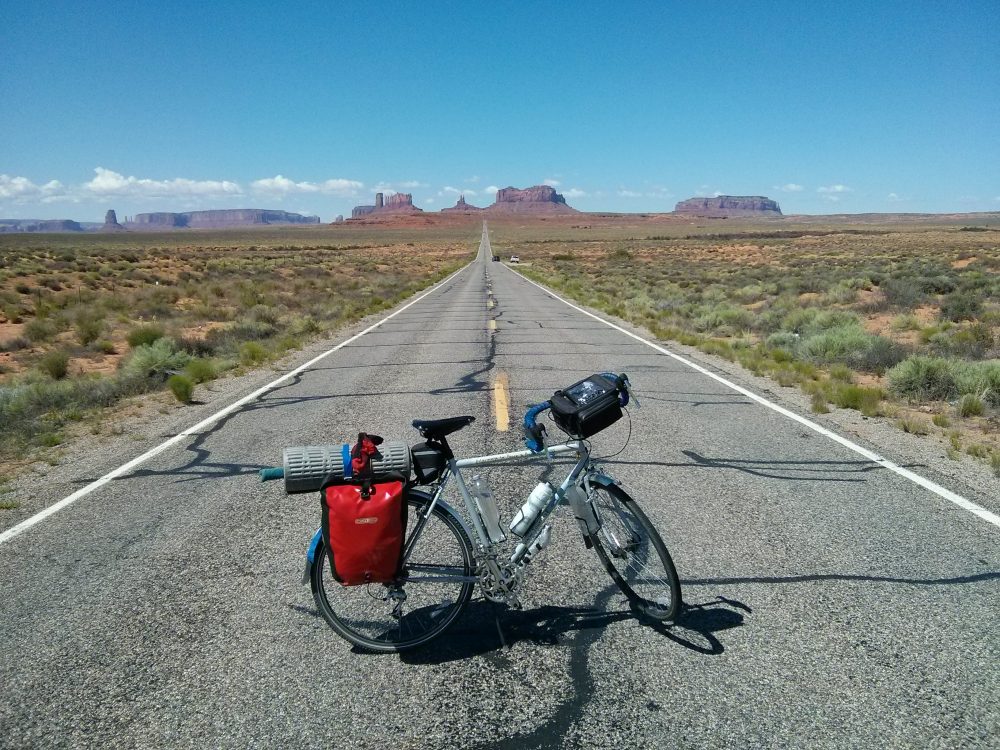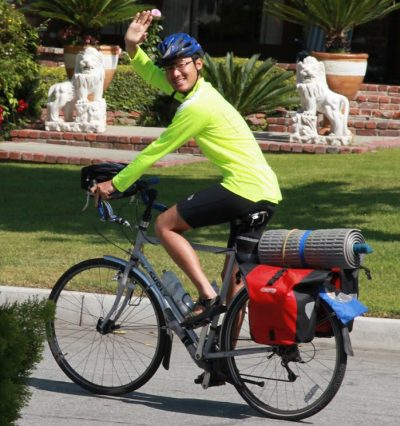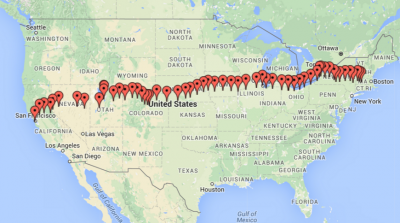Advertisement
Zilong Wang's Bike Ride Across The U.S. On The White Dragon Horse
Resume
This story originally aired on Dec. 16, 2016. This week it appears again as part of our "Summer Vacation" show.
"Strictly speaking, the Cosmic Tale of the White Dragon Horse begins without the White Dragon Horse." — John Brant
I encountered this particular "cosmic tale" when I opened up the 2016 edition of "Best American Sports Writing." The story is about Zilong Wang. It was written for Bicycling magazine by John Brant.
"Zilong grew up in Shanghai," Brant says. "His first bike was a clunker, like most kids rode around in. But when he was 13 in middle school, he had the opportunity to buy this beautiful, shining, hybrid Giant bike."
"A classmate of mine said he could sell me one at about half or 1/3 of the price," Zilong recalls. "And I know for sure that he's selling me a stolen bike, but I wanted the bike so much. And I want to let him shoulder all the bad karma, so I wrote up a contract on a piece of paper saying, 'If there is anything wrong, any people come after me for the bike, he is responsible. I am not responsible.'"
"I didn't know that karma was responsive to contracts," I say. "I thought it was something more mysterious than that."
"That's right," Zilong says with a laugh. "Later I learned the hard way. After about a few months of riding that bike...it got stolen by somebody else again, so I guess that's how karma actually works."
Zilong looked for the bike, of course. He never found it.
"Easy come, easy go — it's karma, so there's no way I can get the bike back," Zilong says.
The White Dragon Horse Is Born
The years rolled by, and Zilong, like lots of young men in China, decided that he would try to further his education by coming to the U.S. He chose Hampshire College in Amherst, Massachusetts…a non-traditional school without grades.
"As soon as I saw the bike, I knew that the bike wanted a name."
A couple of Hampshire alumni had decided to learn about the U.S. by riding across the country by bicycle. They’d survived the adventure. Zilong liked the idea, and, after graduation, he found the bike he wanted to ride. It was a Surly Long Haul Trucker. It wasn’t fancy. But it was…right.
"And it's a silver-white color," he says. "And as soon as I saw that bike, I knew the exact name for it. It's the 'White Dragon Horse.'"
"I've been riding the same bicycle now for five years," I say, "and I have yet to name it. But what made you feel it had to have a name?"

"I didn't want to give it a name, but the journey called for a name. The White Dragon Horse is a mystical creature from the story 'Journey to the West' -- it described a Chinese monk who walked all the way from China to India to bring back the Buddha's teaching. And the horse that the monk rode was the White Dragon Horse. As soon as I saw the bike, I knew that the bike wanted a name."
Part of what attracted John Brant to the story was the audacity of the journey. Another part of the attraction was Zilong’s daily plan.
"He decided, every night, he was going to knock on the door of a stranger, knock on the door and ask if he could pitch his tent in the backyard," Brant says.
"I had no confidence that it would work at all," Zilong says. "So the first night, I could not work up the courage. So I stayed in an empty Boy Scout camp, but there were so many mosquitoes. I got 30 bites. And when I tried to use a hose there to shower, a whole bunch of ants poured out because it wasn't used for so long. That first night out was just so miserable that I decided, 'OK, whatever. I'm gonna knock on doors tomorrow.' And from that day on, every single night that I knocked on a door, somebody said 'yes' and invited me in."
"So nobody ever said, 'No, try some other neighbor?'" I ask him.
"Oh, most people say 'no,'" Zilong says. "One in five say 'yes.'"
Sometimes Zilong thought about turning back. The doubts passed, and the better moments arrived.
"Those moments are when I connect with a stranger, when the next morning, when I depart, we both have tears in our eyes, when I feel this connection with nature, feel this trust in the universe — those are just worth any of the pain, the discomforts."
Warm Encounters, Coast To Coast
Between Massachusetts and California, Zilong connected with lots of strangers. He remembers with special fondness some of the ones who most surprised him.
"The Christian Fundamentalists, the Republicans — at that time it would be Romney and now the Trump supporters. Essentially, for the majority of the trip in the middle of the country, I was staying every night with corn farmers, with people who were volunteering at the church — those who I had thought are close-minded or xenophobic or all these labels. They were the most welcoming and warm and goodhearted people."

Would those people have been as "welcoming, warm, and goodhearted" to anyone asking for tent space and perhaps a cup of tea? Zilong wonders about that in a blog he wrote along the way.
"Just imagine: If I were Black, I would be a good target for some paranoid neighborhood watch. If I were Hispanic, people might wonder if I am in the country legally. If I were Middle Eastern, I might look like a terrorist to some. If I were a white American, I wouldn’t be as interesting as someone from China."
And he was on a bicycle. Maybe people figured, "What harm could be in him?"
"For all the magic of his crossing, for all the cosmic connections that were forged, there was little conventional drama—no fights, no violence, no steamy love scenes. Just a young man pedaling a bicycle all day and talking quietly to people in the evening." — John Brant
"The people's home that I went into, they say, 'Aren't you afraid? Have you met any bad people?'" Zilong recalls. "For that entire 75 days, I have met exactly zero bad person — not even a harsh word or ill intention from anyone, only goodwill after goodwill. So it really gave me a lot of faith in not just the U.S. but also in humanity in general."
True Karma
"In general, his entire journey, I think, went almost like a dream: good luck with the weather, good luck with his bicycle," Brant explains. "Everything seemed to work really well. His health was good. He didn't get injured, didn't get ill. Everything went pretty well. Until he reached the end."
"When I was riding through the U.S., I didn't even bring a lock with me," Zilong says. "I never locked my bike once. I'd leave it outside Walmart, at museums, outside little towns and go away for half an hour, an hour. Come back, the bike is still there — nobody touched it. Three weeks after arriving in San Francisco, the bike was stolen while locked as I went into a fruit stand to get some oranges, just within five minutes."
Zilong called the police. He described the bike. One of the officers wrote down what he said. Zilong was not encouraged to think the White Dragon Horse would turn up.
Is this really, he thinks, how the Cosmic Tale of the White Dragon Horse was supposed to end? And, if so, what to make of it? What is the lesson?
"The loss is greater than the bike. If, as he's always believed, the stolen bicycle he'd bought back in Shanghai was taken from him as some sort of cosmic retribution, what does it mean that he's now also lost the White Dragon Horse—the honestly acquired engine of his transformation and his great understanding and appreciation of so much of life, knowledge, and America? Is this really, he thinks, how the Cosmic Tale of the White Dragon Horse was supposed to end? And, if so, what to make of it? What is the lesson?" — John Brant
The lesson took about 48 hours to reveal itself…and then, it was a beaut. It turned out that a young woman who worked for a company that made bicycle accessories and, hence, knew something about bikes, saw the man who stole the White Dragon Horse with the steed. She thought, "He doesn’t look as if he belongs on it."
"The guy was dressed raggedly, he was not a cyclist, he was riding against traffic, and the bike was way too big for him," Brant says. "And this woman, Vanessa, decided, 'Well, that's weird. That bike is probably stolen, but what am I gonna do about it?' Something you see every day in San Francisco. But for some reason, she couldn't let this go. She couldn't just let the guy ride away. So she started following him, got closer to him, and the guy pulled up into a doorway of an apartment building. And Vanessa said normally she would never think about doing anything like this — she'd never done anything like this before — but something was telling her, 'Well, I'm gonna just talk to this man.'
"Finally, she said, 'This isn't your bike. This is Paul's bike!' The name Paul just jumped into her head. But that was enough to break the ice, and the guy split. It was meant to be. The cosmos was telling her to get this bike back for this man."
"Yeah, that's actually the core of the story, and I'm forever grateful for her — Vanessa was her name — for restoring my faith in humanity," Zilong says.
Continuing His Quest
Who would ask for more than to have his or her faith in humanity restored? And then there’s this question: Who, having ridden across the United States, would ever want to get on a bicycle again?
"So I worked in San Francisco for two-plus years, and one day had this calling that I should go on a journey to the East and ride my bike back to China, where I was from. So nine months ago, I embarked on this journey to the East. A pilgrimage, more or less, around the world once by bicycle in service of the ecological and spiritual awakening of our time."
"And how's that trip going?" I ask.
"Very well — well in the sense that a pilgrimage gives you not what I think I want but exactly what I need, including all the hardship and turmoils inside and outside."
So, the lesson. Perhaps there is no end point to the quest for enlightenment. Maybe once one begins accumulating faith in humanity, mysteriously, the vessel never overflows.
Zilong rides on.
John Brant’s story from "Bicycling" is one of 27 worthy entries in "The Best American Sports Writing 2016," edited by Rick Telander.
Update: Zilong Wang spent the beginning of this summer in the U.K. He traveled by bicycle, visiting a Buddhist monastery and Glastonbury Tor, a hill topped with a 14th-century church tower. He left the U.K. at the end of June.
He’s now continuing his pilgrimage overland to Shanghai, as he says, "in service of the ecological and spiritual awakening of our time."
This segment aired on July 29, 2017.
